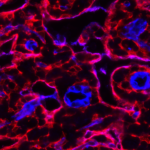Link to Pubmed [PMID] – 16230393
Cancer Res. 2005 Oct;65(20):9312-9
ADAM9 is a membrane-anchored metalloprotease that is markedly up-regulated in several human carcinomas. Here, we show that ADAM9 is similarly up-regulated in mouse models for prostate, breast, and intestinal carcinoma. To assess whether ADAM9 is critical for the pathogenesis of prostate carcinoma, one of the most common cancers in men, we evaluated how loss of ADAM9 affects tumorigenesis in W(10) mice, a mouse model for this disease. In the absence of ADAM9, most tumors in 50-week-old W(10) mice were well differentiated, whereas littermate controls expressing wild-type ADAM9 had predominantly poorly differentiated, and in some cases significantly larger, tumors. Moreover, gain-of-function experiments in which ADAM9 was overexpressed in mouse prostate epithelium resulted in significant abnormalities, including epithelial hyperplasia at 4 to 6 months of age, and prostatic intraepithelial neoplasia after 1 year. A potential underlying mechanism for the role of ADAM9 in prostate cancer emerged from cell-based assays: ADAM9 can cleave and release epidermal growth factor and FGFR2iiib from cells, both of which have pivotal functions in the pathogenesis of this disease. Taken together, these results suggest that ADAM9 contributes to the pathogenesis of prostate cancer and potentially also other carcinomas, raising the possibility that ADAM9 might be a good target for antitumor drugs.


